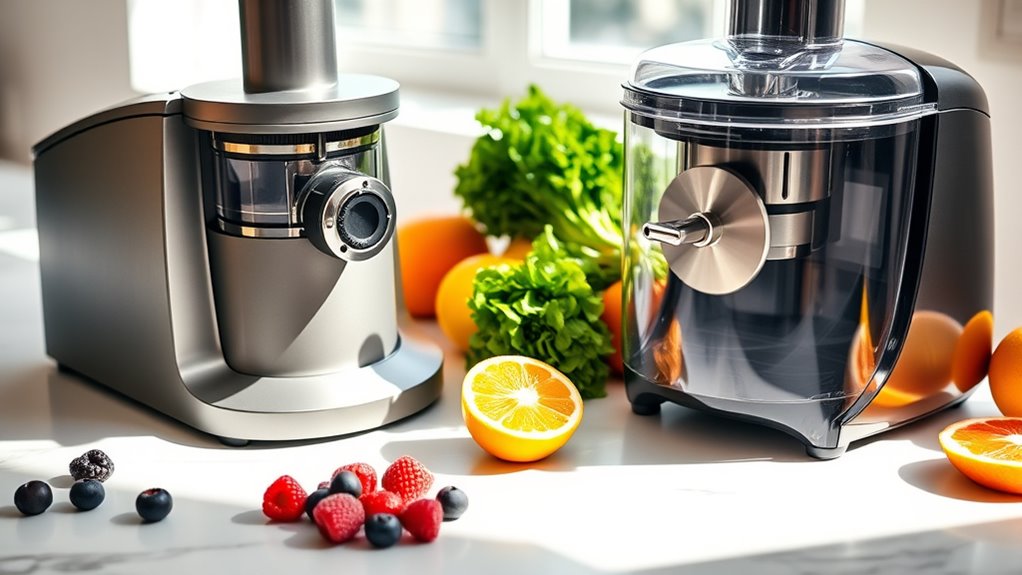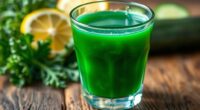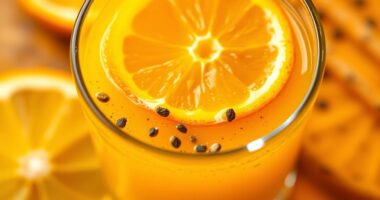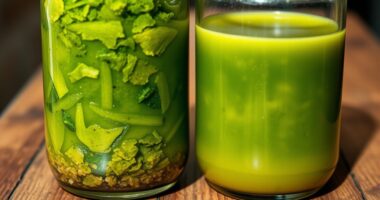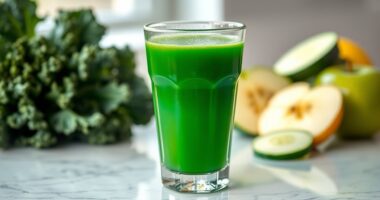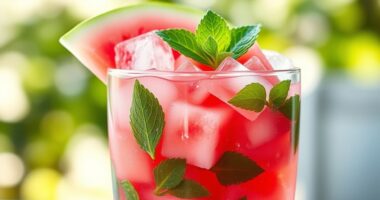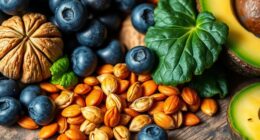Cold‑press juicers extract juice slowly by crushing produce with a screw-like auger, which minimizes heat and oxidation, helping preserve nutrients, enzymes, and delicate vitamins. In contrast, centrifugal juicers spin produce at high speeds, creating heat and exposing juice to more oxygen, which can break down vitamins and enzymes. As a result, cold-press methods generally keep more nutrients intact and produce richer, nutrient-dense juice. To understand how your choice affects juice quality, keep exploring further.
Key Takeaways
- Cold-press juicers extract juice slowly using mechanical pressing, minimizing heat and oxidation, which helps preserve nutrients and enzymes.
- Centrifugal juicers operate at high speeds, generating heat and exposing juice to oxygen, leading to nutrient degradation.
- The gentle pressing in cold-pressing retains delicate vitamins, antioxidants, and phytochemicals better than rapid spinning.
- Higher temperature and oxidation during centrifugal juicing accelerate nutrient loss and reduce enzyme activity.
- Cold-press juices typically have higher fiber content and vibrant color, indicating better nutrient retention compared to centrifugal juices.
How Cold‑Press Juicers Extract Juice
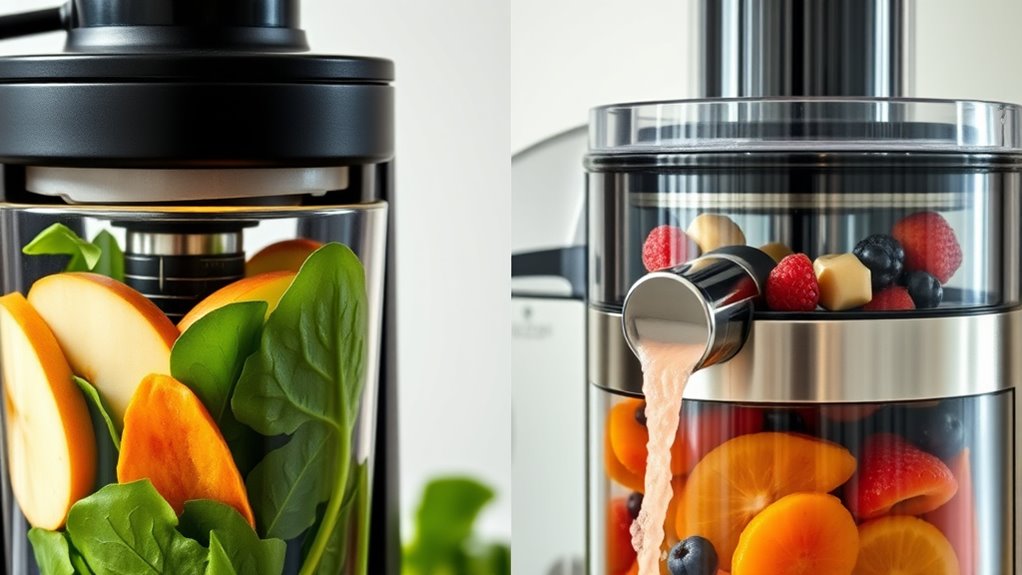
Cold-press juicers, also known as masticating juicers, extract juice by slowly crushing fruits and vegetables through a screw-like auger. This gentle process minimizes oxidation, helping your juice stay fresh longer, which extends the juice shelf life. Because they operate at low speeds, these juicers produce less heat and preserve more nutrients. You’ll find that cleaning is relatively straightforward since there are fewer parts and less pulp buildup compared to other types. The auger’s slow grinding action means you spend less time scrubbing and more time enjoying fresh juice. Overall, cold-press juicers offer a convenient way to maximize nutrient retention while making cleanup manageable, making them a popular choice for health-conscious juice enthusiasts.
The Mechanics of Centrifugal Juicers
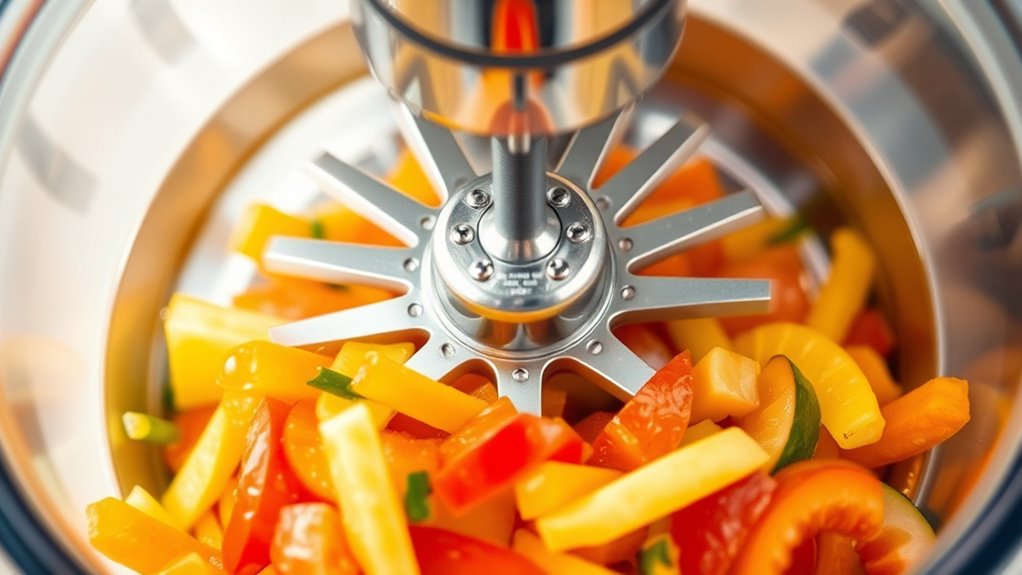
Centrifugal juicers operate by rapidly spinning a flat, mesh basket with a sharp blade at its center. The motor speed is high, often between 6,000 to 14,000 RPM, allowing the blade to quickly cut and extract juice from produce. As the basket spins, the centrifuge design creates a force that separates juice from pulp through centrifugal force. This process pushes the juice outward, where it is collected through a sieve, leaving behind the pulp. The high motor speed enables fast juicing, making these machines convenient for quick use. However, the intense spinning can generate heat and introduce air into the juice, which may affect nutrient quality. Additionally, motor speed plays a significant role in the efficiency of juice extraction and nutrient retention. Overall, the centrifuge design is optimized for efficiency but can impact nutrient preservation compared to slower methods.
Nutrient Preservation in Cold‑Press Juicing
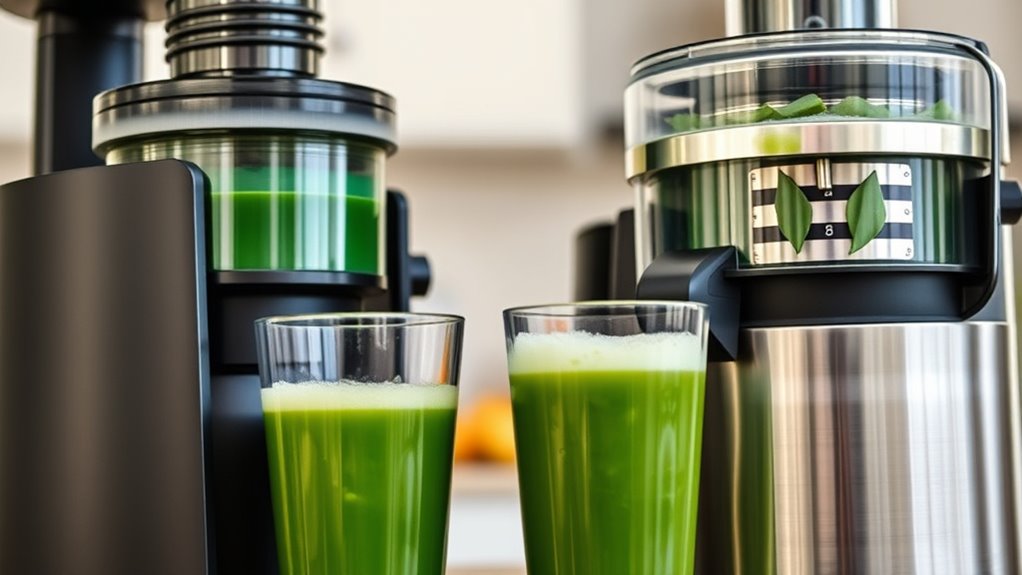
Because cold-press juicing involves slow, mechanical pressing rather than high-speed spinning, it tends to preserve more nutrients and enzymes in the juice. This slow process minimizes juice oxidation, which can degrade essential vitamins. As a result, you benefit from better fruit preservation and higher nutrient content. Cold-press methods retain more antioxidants, enzymes, and vitamins that are easily lost with heat or rapid spinning. To maximize nutrient preservation, look for juicers that gently extract juice without exposing it to unnecessary air. Utilizing vertical storage solutions can help keep your juicing area organized and reduce clutter, ensuring your equipment stays clean and accessible. Additionally, cold-press juicing is often preferred by health-conscious consumers because it preserves delicate nutrients better than other methods. Key advantages include:
- Reduced juice oxidation, maintaining freshness
- Better preservation of delicate nutrients and enzymes
- Longer shelf life due to minimal nutrient loss
The Effect of Heat and Oxidation on Juice Quality
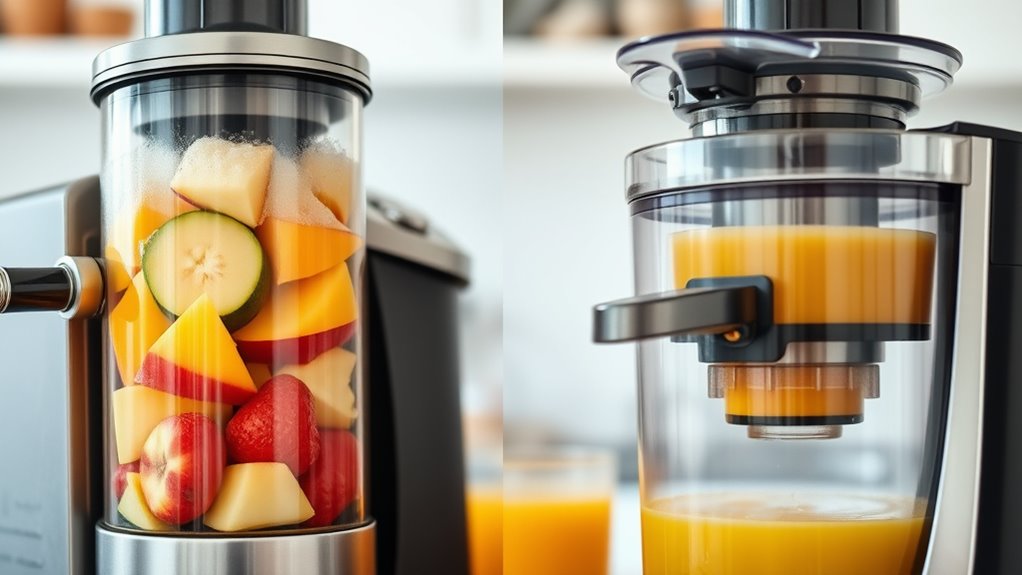
While cold-press juicing minimizes nutrient loss through gentle extraction, exposing juice to heat and oxygen can considerably compromise its quality. Oxidation effects occur when oxygen interacts with the juice, causing it to lose freshness, flavor, and nutrients faster. Centrifugal juicers generate more heat during high-speed spinning, which accelerates heat degradation of sensitive compounds like vitamins and enzymes. This heat can break down nutrients, reducing the overall nutritional value of your juice. Additionally, oxygen exposure during processing and storage promotes oxidation effects, leading to discoloration and a decline in flavor. Proper storage methods such as refrigeration and limiting air contact can significantly slow down nutrient loss and maintain juice freshness. To preserve maximum quality, it’s best to consume fresh juice quickly and store it in airtight containers, minimizing exposure to heat and oxygen. Incorporating nutrient preservation strategies can further improve the longevity and health benefits of your homemade juice. Using proper storage techniques not only extends shelf life but also helps preserve the vibrant color and natural aroma of your juice, ensuring you get the most health benefits from each glass.
Enzymes and Phytochemicals in Fresh Juice
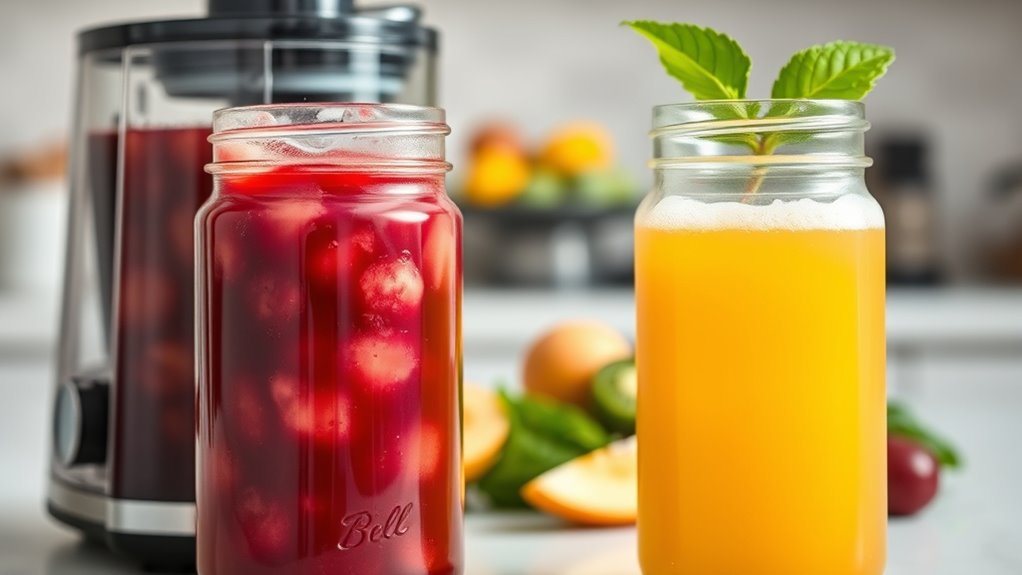
When you choose how to juice, you affect the enzymes and phytochemicals in your drink. Preserving these nutrients can boost your juice’s health benefits and freshness. Factors like temperature and processing method play a key role in maintaining their stability. Additionally, the choice of juicing technique can influence the retention of cookie categories and overall nutrient quality. Selecting a juicer that minimizes heat and oxidation can help retain Glycolic Acid Benefits for Skin and antioxidants, ensuring your juice remains as nutritious as possible. Moreover, understanding Gold IRA Rollovers can inform broader investment decisions that secure your financial future.
Enzyme Preservation Benefits
Enzyme preservation is a key advantage of cold-press juicers, as they operate at lower speeds and generate less heat, which helps maintain the natural enzymes and phytochemicals in your juice. Preserving these enzymes supports ideal enzyme activity, which aids digestion and boosts your overall health. Additionally, intact enzymes can enhance probiotic benefits, promoting better gut health. Cold-press juicers minimize oxidation, ensuring enzymes stay active longer and retain their nutritional value. This process also helps preserve delicate phytochemicals that work synergistically with enzymes to promote wellness. By choosing a cold-press juicer, you’re more likely to enjoy juices that retain their full spectrum of beneficial compounds, providing you with nutrient-dense, health-supporting beverages. Effective preservation methods ensure that more nutrients are retained during the juicing process, maximizing health benefits. Moreover, the quality of the juicer plays a crucial role in maintaining nutrient levels, with cold-press models generally outperforming centrifugal ones in nutrient retention. Incorporating advanced juicer technology can further improve nutrient preservation by reducing exposure to oxygen and heat during extraction. In addition, employing proper storage techniques can help maintain the freshness and nutrient content of your juice for longer periods.
Phytochemical Stability Factors
Preserving the stability of phytochemicals in your juice depends heavily on how it’s processed and stored. Oxidation effects can quickly degrade beneficial compounds like antioxidants and phytochemicals, reducing their health benefits. Cold-press juicers tend to produce juices with better phytochemical stability because they generate less heat and expose the juice to less oxygen during extraction. Centrifugal juicers, which use high-speed spinning, introduce more oxygen and heat, accelerating oxidation effects and breaking down sensitive phytochemicals. To maximize nutrient retention, store your juice in airtight containers and drink it promptly. Minimizing oxygen exposure and limiting heat during processing help preserve the phytochemicals’ potency, ensuring you get the most health benefits from each glass.
Comparing Juice Yield and Quality
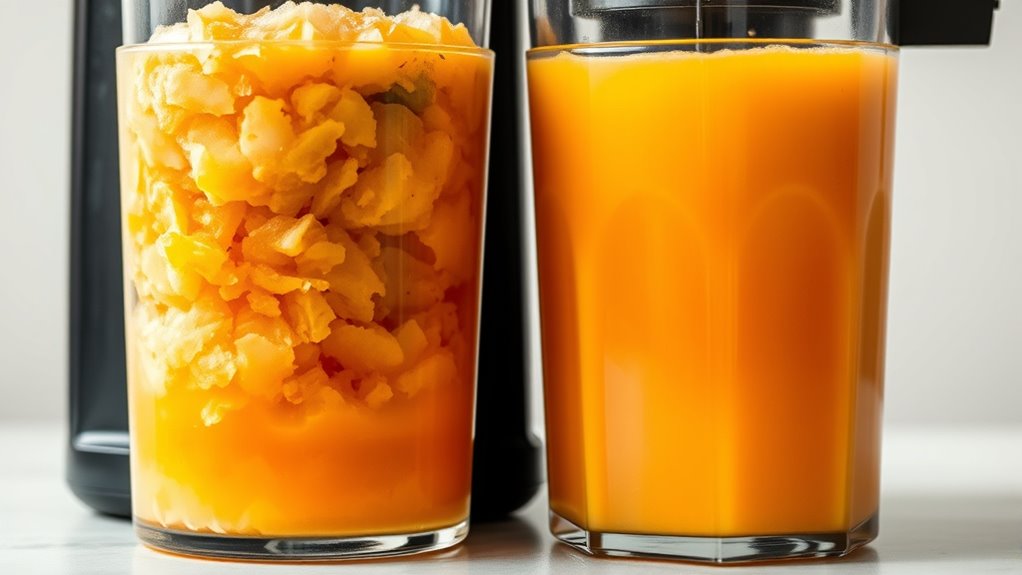
When comparing juice yield and quality, you’ll notice differences in nutrient preservation, with cold-press juicers often retaining more vitamins and enzymes. The clarity and color of the juice can also vary, with centrifugal juicers producing brighter, more opaque results, while cold-press juices tend to be smoother and richer. Additionally, pulp and fiber content differ, influencing how much of the fruit or vegetable’s natural texture ends up in your glass. Understanding nutrient retention in the context of juicing methods highlights how different devices impact the health benefits of fresh juice. Moreover, the oxidation process during juicing can affect nutrient levels, with slower cold-press methods generally reducing oxidation and helping preserve delicate nutrients. Incorporating knowledge from hackathons demonstrates how innovation can improve juicing technology and preserve nutrients more effectively.
Nutrient Preservation Levels
Cold-press juicers typically retain more nutrients and produce higher-quality juice compared to centrifugal models. This means better preservation of vitamins, enzymes, and antioxidants. You’ll notice improved fiber retention, which supports digestion and adds texture. Additionally, cold-press juicers often yield juice with greater clarity, indicating less oxidation and nutrient degradation. To maximize nutrient preservation, consider these benefits:
- Higher fiber content helps retain natural nutrients
- Less heat and oxidation protect delicate vitamins
- Better juice clarity signifies minimal nutrient loss
These factors make cold-press juicers ideal if you want nutrient-rich, fresh-tasting juice. While centrifugal juicers are faster, they often compromise on nutrient retention due to higher temperatures and oxidation during processing. Ultimately, choosing a cold-press juicer helps you get the most nutrients from your fruits and vegetables.
Juice Clarity and Color
Cold-press juicers generally produce juice that is clearer and more vibrant in color compared to centrifugal models. This is because they gently extract juice, preserving the fruit’s natural pigmentation, which results in richer, more appealing hues. Centrifugal juicers, on the other hand, often introduce more juice sediment due to their high-speed spinning, which can cause some pulp and pigments to separate prematurely. As a result, the juice from centrifugal machines may appear murkier and less colorful. Cold-press methods minimize agitation, keeping the juice smooth and visually appealing, with a brighter, more consistent hue. If you value clarity and vibrant color in your juice, a cold-press juicer will generally deliver a more aesthetically pleasing, visually fresh beverage.
Pulp and Fiber Content
Because of their slow, gentle extraction process, cold-press juicers typically produce juice with higher fiber content and more pulp, which can enhance the overall texture and nutritional value. The increased fiber retention means you get more of the fruit’s natural benefits, supporting digestion and satiety. The pulp texture in cold-press juice is often thicker and more substantial, giving a richer mouthfeel. In contrast, centrifugal juicers usually produce clearer juice with less pulp and fiber, resulting in a thinner consistency.
Key differences include:
- Higher pulp and fiber content in cold-press juice
- Richer pulp texture, more satisfying to the senses
- Better preservation of natural fibers for added health benefits
Practical Implications for Health-Conscious Consumers
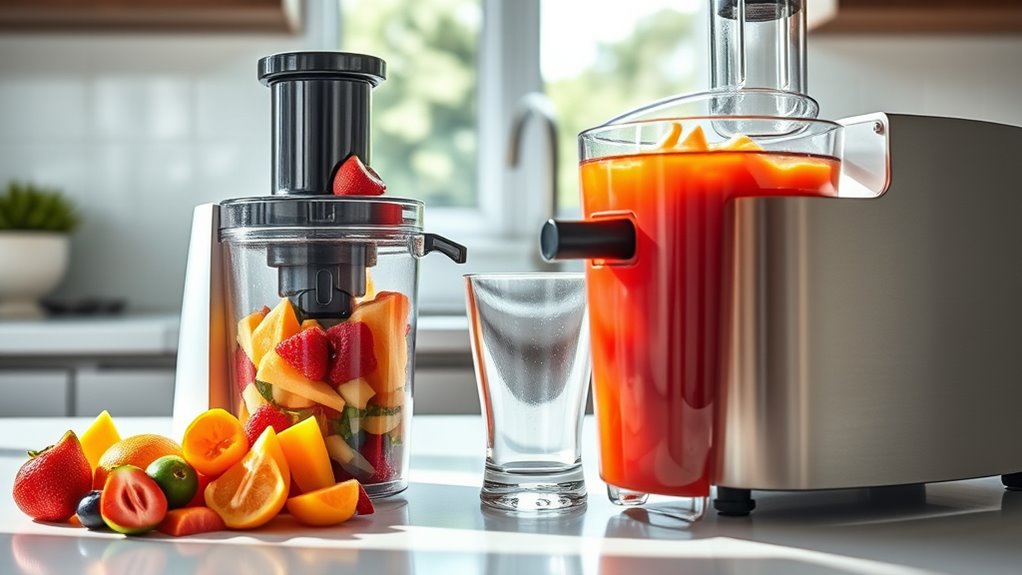
For health-conscious consumers, choosing the right juicer can substantially impact the nutritional quality of your daily intake. When considering practicality, cost savings become important—you’ll want a juicer that’s durable and efficient without breaking the bank. Cold-press juicers often have a higher upfront cost but tend to preserve nutrients longer, reducing waste and making them more economical over time. Centrifugal juicers are usually more affordable initially and are quick to operate, saving you time and effort. Cleaning ease also influences your daily routine; cold-press models typically require more careful cleaning due to their components, while centrifugal juicers are generally easier to clean with fewer parts. Balancing cost and maintenance needs helps you choose a device that supports your health goals and lifestyle.
Choosing the Right Juicer for Maximum Nutrients
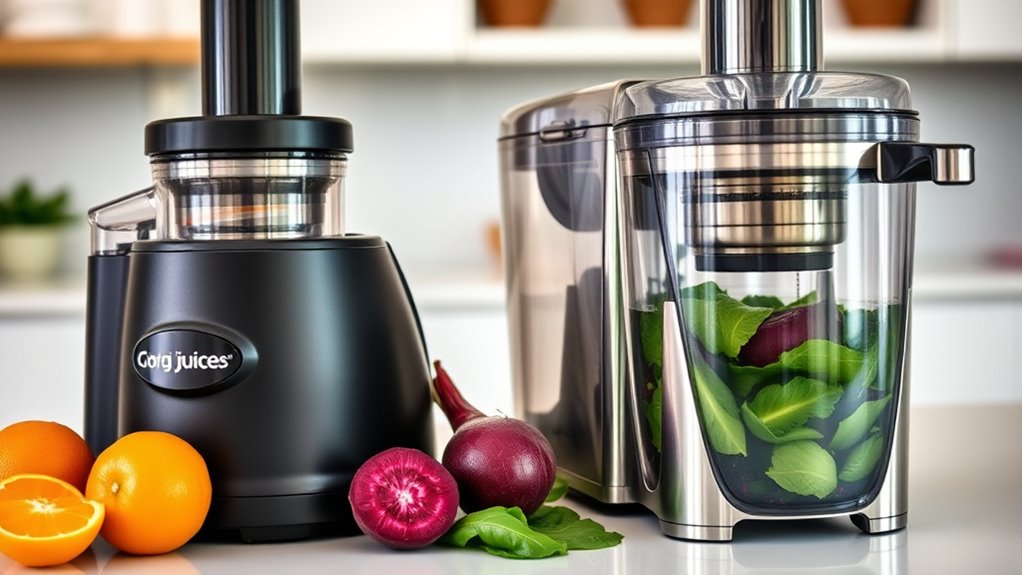
Choosing the right juicer to maximize nutrient retention depends on understanding how each type processes fruits and vegetables. Cold-press juicers preserve more nutrients by gently crushing produce, resulting in richer juice flavor and longer-lasting freshness. Centrifugal juicers, on the other hand, work quickly but may introduce heat and oxidation, slightly reducing nutrients. When selecting a juicer, consider these factors:
Choosing the right juicer ensures maximum nutrients, great flavor, and lasting freshness.
- Juice flavor: Cold-press methods often produce sweeter, more vibrant-tasting juice.
- Machine durability: Look for sturdy construction if you plan to juice regularly; centrifugal machines can wear faster under heavy use.
- Ease of cleaning: Cold-press juicers tend to be easier to clean and maintain, ensuring consistent nutrient retention over time.
Choosing wisely ensures you enjoy maximum nutrients, ideal juice flavor, and a durable machine for your health journey.
Frequently Asked Questions
Do Cold‑Press Juicers Retain More Flavor and Aroma Than Centrifugal Models?
You’ll find that cold-press juicers better preserve flavor and aroma than centrifugal models. Their slow extraction process minimizes oxidation, leading to superior flavor preservation and richer aroma retention. This means your juice will taste fresher and more vibrant, capturing the true essence of the fruits and vegetables. If flavor and aroma are priorities for you, a cold-press juicer is the way to go, delivering a more aromatic and flavorful juice experience.
How Do Different Fruits and Vegetables Impact Nutrient Retention in Each Juicer Type?
Did you know that softer fruits like berries lose more nutrients in centrifugal juicers? Your choice impacts nutrient retention, especially for delicate produce. Cold-press juicers excel at enzyme preservation and maintaining fruit fiber, making them ideal for nutrient-rich juices. Harder vegetables, like carrots, fare well in both types, but softer fruits benefit from cold-press juicing, which helps preserve delicate nutrients and flavors better.
Is Cleaning and Maintenance Easier With Cold‑Press or Centrifugal Juicers?
When comparing cleaning ease and maintenance simplicity, cold-press juicers generally make your life easier. They have fewer parts and are easier to disassemble, which speeds up cleaning. Centrifugal juicers tend to have more components and can be messier to clean after use. With a cold-press, you spend less time maintaining, and the process is more straightforward. So, if you want hassle-free cleaning, a cold-press juicer is your best bet.
Which Juicer Type Is More Energy-Efficient for Daily Use?
You might think a fancy juicer uses less energy, but surprisingly, centrifugal juicers often have higher energy consumption due to fast motors. Cold-press models run slowly and quietly, saving on operational costs over time. So, if you’re aiming for efficiency, a cold-press juicer’s lower energy use makes it smarter for daily use, reducing your electricity bill while giving you fresh juice. Irony? Speed doesn’t always mean savings.
How Do Price and Durability Compare Between Cold‑Press and Centrifugal Juicers?
When comparing cold‑press and centrifugal juicers, you’ll find that cost comparison often favors centrifugal models, which tend to be cheaper upfront. However, cold‑press juicers usually feature higher material quality, making them more durable over time. While cold‑press juicers may cost more initially, their superior build quality means they last longer, offering better value. So, if durability matters, investing in a cold‑press juicer could be the smarter choice.
Conclusion
When it comes to getting the most nutrients from your juice, cold-press juicers are your best bet—they preserve enzymes and phytochemicals better than centrifugal models. While they might take a bit longer, the extra effort pays off in richer, fresher juice. Don’t put all your eggs in one basket, though—consider your lifestyle and needs. Ultimately, choosing the right juicer means you’re investing in your health, not just quick fixes.

